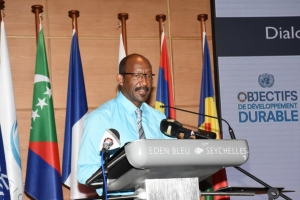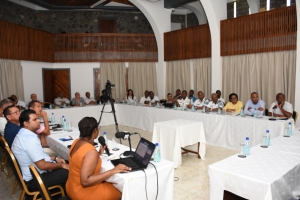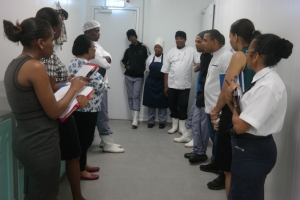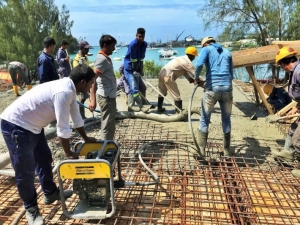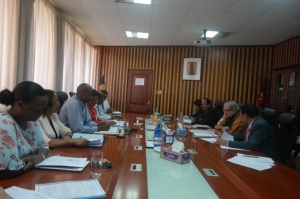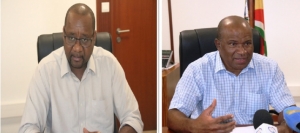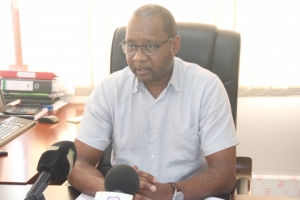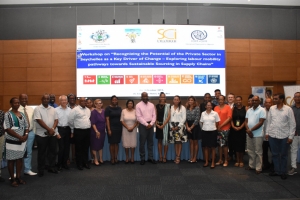VP Meriton souligne l’importance particulière de la migration pour les petits Etats insulaires de la COI
Le Vice-Président Vincent Meriton a souligné l’importance particulière de la politique migratoire pour les Etats de la Commission de l’Océan Indien (COI au cours de la première Réunion consultative sur l'établissement d'un dialogue régional sur les migrations (DiMOI) ouverte ce lundi à Eden Blue, à Mahé.
Rappelant la petitesse des Seychelles dotées cependant d’une immense zone économique exclusive, M. Meriton s’est beaucoup appesanti sur le cas particulier de ce pays pour illustrer la sensibilité de la question pour les Etats de la COI.
« Comme vous le savez, les Seychelles accueillent aujourd’hui environ 21 000 travailleurs étrangers. Ils sont employés en majorité dans les secteurs de la construction, du tourisme et de la pêche. A ce jour, nous sommes parmi les pays, si ce n’est le seul au monde, où l’exemption de visa est ouverte à tous. C’est dire, que la migration et la liberté de circulation des personnes sont au cœur de l’économie et de la vie seychelloise », a-t-il dit.
« En tant que petit État insulaire en développement, situé à quelques kilomètres de la côte somalienne et au milieu de l'Océan Indien, les Seychelles ne sont pas à l’abri des menaces maritimes telles que les actes de piraterie, le trafic de drogue, les crimes transnationaux, la pêche illicite, non déclarée et non réglementée, l’immigration clandestine et la traite des êtres humains. Afin de lutter efficacement contre ces graves menaces, il est essentiel que nous utilisions pleinement les plates-formes comme celle-ci, afin de favoriser le dialogue et la coopération entre nos États afin de consolider des actions correctives concrètes », a-t-il aussi souligné.
Le Vice-Président Meriton, qui est aussi le président en exercice du Conseil des ministres de la COI, a rappelé que les États membres de la COI partagent des réalités migratoires communes qui sont souvent discutées sous l'angle de la sécurité maritime ou du changement climatique. Il existe un large éventail de réalités et de priorités en matière de migration qui affectent et sont partagées par ces pays qui sont historiquement ou géographiquement connectés les uns aux autres.
C’est dire qu’améliorer la gestion des flux migratoires grâce à la cohérence des politiques, le renforcement des capacités et la gestion de l’information, revêt-il une importance stratégique pour ces pays qui sont les Comores, la France/Réunion, Madagascar, Maurice et les Seychelles.
Programmée, du 26 au 28 aout, cette rencontre régionale doit donc discuter de la raison d'être et de la pertinence d'un Processus Consultatif Régional (PCR) et des prochaines étapes en vue du dialogue sur la migration pour les pays de la COI.
M. Meriton a remercié le directeur Régional de l’Organisation Internationale pour les Migrations pour l’Afrique australe, M. Charles Kwenin, pour avoir confié l’organisation de la rencontre aux Seychelles. Une rencontre qui, a-t-il rappelé, est en ligne avec la décision du 33e Conseil des ministres de la COI de septembre dernier, qui a invité le Secrétariat général de la COI à poursuivre la réflexion et à proposer des solutions pour répondre aux préoccupations des États membres, en ce qui concerne la facilitation des mouvements de populations et la connectivité maritime.
Avant de lancer officiellement les travaux, il a saisi l’occasion pour dénoncer la libération précoce par le Somaliland des 19 Somaliens convaincus de piraterie et condamnés par la Cour de justice.

Complements of Seychelles NATION
Stakeholders, partners in tourism trade commend l’Union Estate for economic turnaround
he remarkable economic turnaround of l’Union Estate on La Digue during the past 21 months has been commended by stakeholders and partners in the tourism trade.
This was during the last multi-sectoral meeting for this year held yesterday morning at National House.
The meeting, chaired by the Minister for Tourism, Civil Aviation, Ports & Marine Didier Dogley, was also attended by the Minister for Employment, Immigration & Civil Status Myriam Telemaque and the Minister for Environment, Energy and Climate Change Wallace Cosgrow.
Among the key facts that came out of a presentation on l’Union Estate on La Digue, which is the major source of employment on the island, is that an estimated 150 households (approximately 25% of La Digue population size) depend on it for an income.The estate employs 100 people of whom 95% are Seychellois /Diguois but there are also regular casual workers and indirect jobs through kiosk/beach vendors, tour guiding, tour operators, taxi operators who all depend on the l’Union Estate park operations.
Some 179,000 tourists visited l’Union Estate last year and this year from January to September altogether 137,000 visitors have visited the estate. This represents an average of 500 tourists per day and based on national statistics, l’Union Estate is getting on average between 55 to 60% of visitors holidaying in Seychelles with the peak periods being March, April, August and October.
It has been revealed that for the last 21 months l’Union Estate has made a profit of around R16 million out of which almost R9 million has been paid out as taxes to government which represents 56% of the estate’s contribution to the economy.
Meanwhile the estate’s operational costs during the same period has amounted to R30.6 million out of which around R23.5 million represents expenditure on operation for the estate’s park handling which include repairs, cleaning and maintenance, cost of cleaning material, promotional activities to name but some while the remaining R7.1 million went into the farming and agricultural activities.
It is worth noting that from January 2018 to September 2019 a total of 292 foreign weddings have been conducted at the estate which represents an average of 1.5 weddings a day.
But in spite of its good economic performance there was a concern that the entrance fee of R115 being charged per visitor was a rip-off. Frank Hoareau, the chairperson of the board of directors of l’Union Estate, went on to detail the different attractions that the estate offers to visitors like the plantation house, vanilla plantation, coconut mill which all need proper upkeep and he also went on to elaborate other initiatives that are being undertaken together with the Seychelles Heritage Foundation to promote and enhance the estate’s attractiveness and increase visitors’ experience.
But Minister Dogley said a visitors’ survey would be good to know how the many foreign visitors feel about the estate, something he has called on its board to take up.
Crime against tourists was an issue that was once against discussed. Through a presentation by the police it came out that the trend in general shows a decrease even though there has been a significant increase in February – from 14 cases last year to 30 cases in 2019, an increase of 16 cases – and then the following months, March to June, the cases have decreased considerably – from a total of 89 cases last year to 72 in the same period this year.
In July there was a case more than last year and then in August there was a sudden rise of 30 cases, a 20 case increase compared to only 10 during the same month last year.
Break-ins, thefts from tourism establishments and from beaches remain the most common form of offences.
Some business owners do not believe the police statistics detail enough the crimes taking place on Praslin and La Digue, which would give them a clearer indication what is happening and what is being done to address the problem on the islands.
The commissioner of police, Kishnan Labonte, said the fact that 52% of crimes are taking place in tourism establishments nationally shows there is a need for establishments big or small to step up security measures at their establishments.
The concern raised was that smaller establishments do not have the means to set up CCTV cameras or other highly sophisticated measures. But with a breakdown in statistics it is believed this would help small establishments to come together and organise security protection for their establishments.
The employment department also made a presentation on the National Labour Migration Policy and this was followed by questions and clarifications in relation to employment of foreign workers and the length of time they need to remain in employment before their positions are localised.
Issues relating to the two Bangladeshi employment agencies were also raised and there were concerns that establishing contacts with them is not easy. There have been calls to have two representatives of these agencies based here to facilitate the recruitment process for businesses.
Increase in GOP fees was also raised and Minister Telemaque has stated that all these concerns should be brought to the government’s attention through the right mechanisms.
With regard to the issue of renting beach beds, Minister Dogley noted that there are numerous opportunities for tourism related business diversification activities in the tourism sector which are yet to be explored but beach beds with umbrellas and other activities related to it is something that the tourism sector believes goes totally against what foreign visitors come looking for when they come to Seychelles. He said discussions are ongoing to reach a consensus between government and actors in the business before any pronouncement is made, a point which the Praslin Business Association is also totally against.
Christopher Gill of the Praslin Business Association stated that the discussions were frank and on the issue of beach beds he noted that beaches cannot be turned into marketplaces and in the process destroy the visitors’ dream of spending memorable moments on white sandy beaches.
He said such activities are called hawking and it is not good for the prosperity of our tourism industry.
Complements of Seychelles NATION
Marie-Anne Lepathy
Department of employment’s productivity unit poem competition Contestants rewarded
During this year’s Productivity Week, the productivity unit in the Ministry of Employment, Immigration and Civil Status in collaboration with the Ministry of Education and Human Resource Development launched a poem competition under the theme ‘My Seychelles, My Work, My Responsibility’ (‘Mon Sesel, Mon Travay, Mon Responsabilite’)
Those who took part in the competition were awarded yesterday afternoon in a short ceremony at the Carrefour des Arts in Victoria. In attendance were the Minister for Employment, Immigration and Civil Status, Miriam Telemaque, the principal secretary of tertiary education and human resources development, Dr Linda Barallon, the chief executive of Airtel, Amadou Dina amongst other guests.
“The aim of the competition was to promote and foster awareness on the importance of productivity at an early age,” said Marie-Vonne Francis, who heads the productivity unit within the employment department.
She added that it was an opportunity for the students to reflect on the mentioned theme, come up with innovative and creative ideas on how to use the theme in their own perspective through the poem competition. Furthermore the productivity unit in the department of employment wanted the students to take part in conceptualising things associated with productivity.
“It is a good strategy to get students acquainted to productivity issues at the earliest of age so that the concept carries through them to adult life,” Ms Francis said.
The competition was open to all students of primary, secondary and professional centres in Seychelles. For this year’s competition a total of 166 poems were submitted. One hundred (100) poems were from primary schools with Anse Royale primary school submitting a total of 49 entries. As for secondary schools there were 64 poems submitted and Anse Royale secondary school recorded the highest number of entries with 25. On the other hand, the organisers received only two entries – Greg Bradburn and Rachel Payet – from the professional centres.
“When I heard about the competition I was interested in participating and show my creativity as an artist,” said Greg.
He described his poem as an homage to the past.
There were three prizes – first, second and third – in each of the three categories
Complements of Seychelles NATION
Employment, Immigration and Civil Status Minister Myriam Télémaque visits Apex Hotel Supplies Ltd and ISPC
Minister stresses on importance of human resource management in workplaces
Employees of Apex Hotel Supplies Ltd and those of ISPC – two establishments in the wholesale and retail business – recently had the opportunity to bring their concerns and challenges encountered at work to the attention of Employment, Immigration and Civil Status Minister Myriam Télémaque.
The minister visited the two workplaces based at the SIBA Warehouse on Bois de Rose Avenue as part of her routine visits to different workplaces to listen to employees and see firsthand their work environment.
Minister Télémaque first interacted with the 94 employees of Apex at their different work stations. Out of the group, 12 are foreigners. At ISPC there are 79 employees and 16 are foreigners.
As in all her visits, Minister Télémaque provided the employees the opportunity to freely express their challenges as well as talk about the good practices being put in place by their employers.
There were many concerns raised by the workers of both companies that the minister believes could have been dealt with internally to the satisfaction of both parties had there been a proper human resource management set-up in place.
The existing arrangements are very much fragmented therefore providing no structured channel for the workers to bring out their concerns, thus making them become frustrated and discouraged.
The absence of an effective human resource management system to successfully undertake human resource planning and carry out related policies can cause a lack of proper communication and distance management from employees which affects employees’ morale and productivity.
For any business its workforce is one of the most important drivers for growth. If they do not have an avenue to discuss their concerns and challenges, frustration builds up and the company may end up losing its most valuable asset.
This is exactly the point Minister Télémaque discussed with management after touring the different work stations and listening to the employees.
It is the priority action that both companies have been encouraged to undertake so that employees’ grievances could be resolved within the shortest delay.
Minister Télémaque also took the opportunity to remind the top leaders of both businesses that in order to have a productive workplace, there needs to be effective motivational and management strategies in place. She said while there are some good practices being undertaken by both companies such as discounts on goods purchased at the shop, those positive aspects are being overshadowed by so much discontent and mistrust on the part of the workers. She noted that both companies have so much potential to grow but for that to happen, workplace harmony has to prevail.
Meanwhile, the employment department will continue to work closely with both businesses in order to provide guidance and support so that they are able to move forward. Employment officers will undertake follow-up visits within appropriate time to monitor the implementation of the recommendations discussed with management.
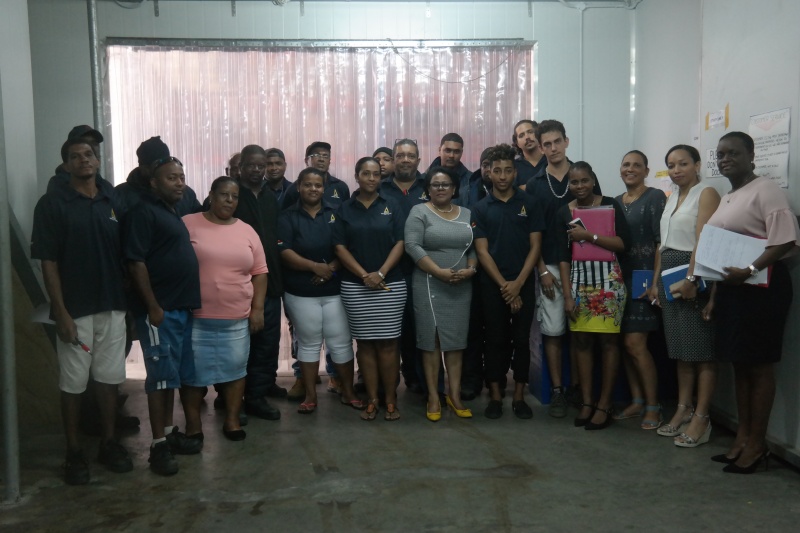
Minister Télémaque and her team in a souvenir photo with Apex workers
Complement of Seychelles NATION
In the National Assembly
New policy for foreign workers
First of its kind in Seychelles, a new policy targeting foreign workers in the country was yesterday revealed to the National Assembly and the general public.
Employment, Immigration and Civil Status Minister Myriam Telemaque revealed the details of this policy during the National Assembly’s morning session yesterday.
The policy has been proclaimed as an important document which would not only safeguard the rights of Seychellois workers but also that of foreign workers.
It has been developed with the help of the International Labour Organisation (ILO) which conducted a study prior to the policy to identify issues which were in need of addressing in the document.
The policy has also been modeled on countries that have some good practices in this domain and their practices have been adapted to fit the local context.
Minister Telemaque started off by explaining that statistics have shown that the number of expatriate workers in the country is on the increase.
“As our economy continues to grow so does the demand for more workers and what is most important is that we have structures in place which will manage this fact well, so that expatriate workers are recruited only when there is a lack so that we preserve the Constitutional rights of our people to decent work[…]”
In 2018 alone, the department of employment recorded 12,835 applications from employers seeking foreign workers. This figure represents both new demands and renewal of contracts.
It is projected that the need for expatriate workers will rise as many projects are to be undertaken in the next few years in the tourism, fisheries, education, health and financial sectors.
The policy comprises four main strategies.
“The first strategy concerns the governance on migrant work. This is to ensure that we have institutions that are effective and, procedures and legislations are in place to govern migrant work based on information that are real and which includes the participation of key partners,” said Minister Telemaque.
“The second strategy protects the rights of all workers. It will protect the rights of migrant workers and maintain the highest standards in regards to working conditions,” Minister Telemaque read out.
“The third: development of human resource. This is to ensure that the necessary skills are available in the country to meet the demands on the labour market. It will promote employment that is productive and sustainable for all employees,” she added.
“Fourthly, recruitment that is fair and effective to promote recruitment practices that are just and effective for all employees,” the minister added.
Under the first strategy, a committee comprising key stakeholders is expected to be set up to monitor the implementation of this policy. It will consist of representatives from the private sector, ministries of education and health, National Bureau of Statistics (NBS), non-government organisation and workers.
The policy will also amend the ministry’s quota system in that quotas for certain sectors, such as construction, will change from a percentage quota to a fixed number.
For the construction sector, the quota of migrant workers allowed will now be based on the class categories rather than percentage.
That means that contractors that are class 1 will be allowed 300 foreign workers, class 2 will be allowed 150 foreign workers, class 3 has been allocated 75 and 50 foreign workers for class 4.
It will also be mandatory for an employer who is recruiting workers to register in the Skills Development and My First Job programmes.
Additionally, the policy will not allow for foreign workers to change employers unless they are victims of human trafficking
A new element that has been included in the policy is that an organisation with 25 and more employees will now have to draw up salary structures that are in line with ILO’s concept of ‘Equal pay for work of equal value’.
Organisations with 25 employees or more will additionally have to employ a human resource officer.
The ministry is also expected to sign various bilateral agreements with countries from which foreign workers are recruited, similar to the bilateral agreement Seychelles recently signed with Bangladesh to streamline the manner in which foreigners are recruited.
This is to ensure that all relevant procedures are followed to a tee in order to discourage cases of human trafficking.
Further than that, regulations will be put in place to regulate the work of recruitment agencies.
The policy also touches on subjects such as recruitment process, training programmes, contracts and certificates of entitlement.
Minister Telemaque stressed that this new policy will have to be evaluated and revised regularly in order for it to remain relevant.
Complement of Seychelles NATION
Seychelles minister for labour holds technical meeting with Bangladeshi counterpart
The Minister for Employment, Immigration and Civil Status, Myriam Telemaque, in the presence of officials from the Ministry of Foreign Affairs, welcomed the Bangladeshi Minister for Expatriates Welfare and Overseas Employment, Imran Ahmad, and his delegation at Independence House on Monday this week for a technical meeting.
Minister Ahmad was in Seychelles on a three-day visit specifically for the signing of the Bilateral Labour Agreement between the Republic of Seychelles and Bangladesh.
A moratorium on the recruitment of workers from Bangladesh was imposed last year in October 2018 until a Bilateral Labour Agreement is signed between the two countries. This came in the light of many cases that were surfacing as a result of proven unethical recruitment practices going on at both ends. Since then discussions started to draft the Agreement and the process included a visit by a delegation from Seychelles to Bangladesh led by the principal secretary for employment, Jules Baker.
The technical meeting on Monday emphasised the mutual interest of both governments to ensure protection of the rights of the Bangladeshi workers, their welfare and good working and living conditions while in employment in Seychelles.
The implementation of the Agreement is to ensure the workers register with the specified recruitment agencies or with competent authorities in Bangladesh, that they are of the right skills and properly prepared through an orientation programme so that their adaptation to the local culture goes smoothly.
Stating that there were around 21,000 foreign workers in Seychelles by end of 2018, Minister Telemaque said that demand for labour will continue to be high and reassured of Seychelles’ commitment towards treating all workers in Seychelles equally, no matter their nationality.
Minister Ahmad on his part expressed that the agreement will open up for collaboration in other areas including investment possibilities, and that they can also make provisions for labour in certain sectors like IT, teaching and nursing. During his visit, he also met with some Bangladeshi workers in Seychelles and impressed upon them the need to follow Seychelles laws and way of life.
Minister Telemaque welcomed the idea of further collaboration between the two countries. She particularly spoke about how Seychelles aspires to develop further collaboration with Bangladesh in the field of climate change and the Blue Economy.
She acknowledged and recognised the similar difficulties faced by Bangladesh on the effect of climate change and said that Seychelles is open to technical cooperation and exchange in regards to its adaption and mitigation.
The interest to negotiate and conclude a Bilateral Air Service agreement between the two countries were also received by Minister Telemaque. She added that Seychelles is keen to share experience and expertise in the fisheries field with the main focus on aquaculture, extending compliments to Bangladesh for the remarkable development in the agriculture sector, particularly in innovative practices and organic farming methods.
Another interest she said is in the tourism sector as Seychelles continues to witness a rise in the number of visitors from Bangladesh, hence establishing and deepening collaboration in the field of tourism could benefit both countries.
To conclude the meeting Minister Telemaque expressed her appreciation to the officials of both ministries including the department of Foreign Affairs and the Consul for Seychelles, for their dedication and commitment in finalising the Agreement.
Minister Telemaque thanked Minister Ahmad for his presence in the country towards the implementation of the Agreement, which was signed the same day in the afternoon.
Minister Ahmad’s three-day visit also included a visit to Ralph Hoareau’s farm at Anse Royale where some Bangladeshi workers are employed.
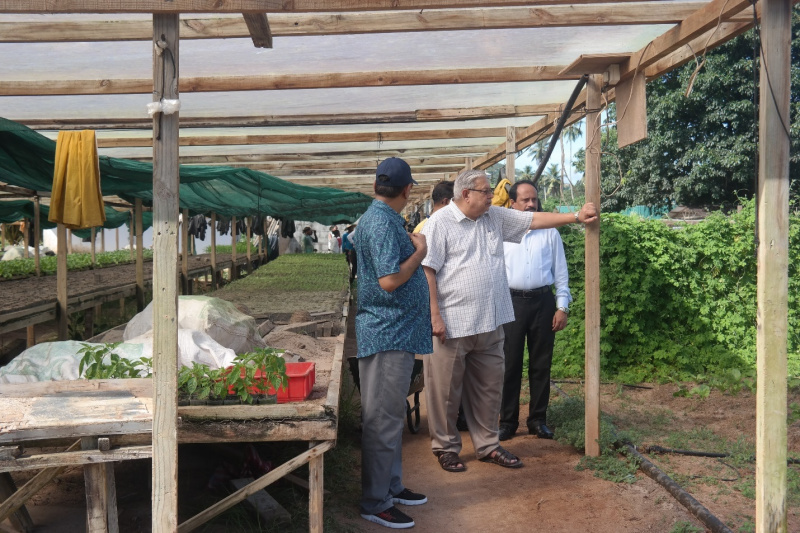
Visiting Ralph Hoareau’s farm at Anse Royale
Complement of Seychelles NATION
Officials give further details on labour agreement with Bangladesh
With the labour agreement with the Bangladesh government signed and moratorium on recruitment of Bangladeshi workers finally removed, the Ministry of Employment, Immigration and Civil Status have now revealed the new procedures for recruiting Bangladeshi workers.
These procedures have already been communicated to employers.
The ministry imposed a moratorium on the recruitment of Bangladeshi workers in Seychelles in October 2018, preventing local employers from sourcing their employees from Bangladesh.
More than 1600 Bangladeshi were recorded to be working in Seychelles as of August 2019, mostly in the construction and agricultural sectors.
The new labour agreement between Seychelles and Bangladesh was signed this week by the Minister for Employment, Immigration and Civil Status Myriam Telemaque and Bangladesh’s Minister for Expatriates Welfare and Overseas Employment Iman Ahmad.
This agreement was designed with the aim of implementing proper procedures for employment and repatriation, protecting the rights of migrant workers and preventing trafficking in persons and illegal employment.
“This agreement has given us a stepping stone to prevent and control human trafficking. As you know, Seychelles has witnessed a few cases of human trafficking where some foreign workers have faced labour exploitation to the extent that they have been bought and sold on the local labour market and this cannot be tolerated,” the principal secretary for employment, Jules Baker, explained.
Under this agreement, employers will have to cover all travel expenses of Bangladeshi migrant workers from and to Bangladesh.
These expenses will include maintenance expenses while travelling, inclusive of sickness or hospitalisation costs as well as transportation costs for personal belongings.
“It is also a requirement for the Bangladeshi worker to speak basic English. The Bangladeshi government has committed itself to ensure that the Bangladeshi workers coming to Seychelles speak and understand basic English,” PS Baker added.
“If necessary, they will have to go to school for six months to learn how to communicate in English. And given that employers might not have the time to wait six months for a worker, the Bangladeshi government will put in place a mechanism to teach them English earlier on so that there will be a pool of workers available to meet demands.”
Another condition that has been set is that all employers seeking Bangladeshi workers will now have to go through two designated public employment agencies in Bangladesh – Bangladesh Overseas Employment and Services Ltd (BOESL) and Bureau of Manpower Employment Training (BMET).
Employers will also be able to pay these agencies using Seychelles Rupees instead of foreign exchange as had been commonly practiced when using private agencies.
“This will streamline sourcing out of foreigners in Bangladesh because there are more than 1600 employment agencies in Bangladesh which makes it very difficult for the Bangladeshi government to control,” PS Baker stated.
Going through the two designated agencies is the only process by which Bangladeshis coming to work in Seychelles will receive a smart card containing all their biometric data.
This smart card is one of the essential documents that a Bangladeshi worker will have to produce in order to be allowed entry into the Seychelles.
The other indispensable documents for entry in Seychelles are:
- A valid passport for at least the duration of the contract of employment
- A police clearance certificate
- A valid work permit (Gainful Occupation Permit)
- Contract of employment attested by the Seychelles employment department.
The principal secretary for Immigration and Civil Status, Alain Volcère, noted that all work permits must be endorsed by the Consulate of Seychelles to Bangladesh which is located in Dhaka, Bangladesh.
PS Volcère further explained that Bangladeshi workers currently in Seychelles do not have to prescribe to these conditions until their contract and permits expire, after which they will have to go back home and abide by the BOESL and BEMT process.
PS Baker also noted that a business which has put in an application for expatriate workers will have to be registered with the registrar of companies, so as to eliminate middle men who bring in expatriate workers for other local employers.
“The department of employment will not give permission to any organisation which is not registered with the registrar of companies in Seychelles. Businessmen or companies that are recruiting foreign labour will thus have to submit a registration of incorporation from the registration division to certify that they are registered.”
The employer will further be liable to provide the expatriate workers with decent accommodation that has been certified by the Ministry of Health.
The employer will equally be responsible for bearing the medical cost for Bangladeshi workers as well as for their repatriation in cases of illness or injury.
“This agreement with Bangladesh will facilitate other agreements with other countries from which we recruit foreign labour. It will ensure that everything is done in a well-organised manner and eliminate instances of false documents such as false passports, GOPs and certificate of employment,” PS Baker concluded.
The Ministry of Employment, Immigration and Civil Status have confirmed that similar labour agreements are in the works with India, Sri Lanka and Nepal.
Complement of Seychelles NATION
Second quarter for 2019
Unemployment rate down by 0.1 percent
The unemployment rate for quarter 2 of 2019 is down 0.1 percent from quarter 1 2019 and 1.5 percent lower than quarter 2 last year according to statistics compiled by the National Bureau of Statistics (NBS).
In a press conference held yesterday afternoon principal statistician of social statistics at NBS, Maria Payet, and chief policy analyst at the department of employment Susan Morel explained the labour market statistics noting that despite the unemployment rate for quarter 4 of 2018 being low at 2.1 percent, and 3.6 percent for quarter 1 of 2019, it is the normal trend on account that more people are seeking employment at the beginning of the year including school-leavers who are seeking jobs and are ready to enter the labour market.
It must be noted that the universal definition of “unemployed” refers to persons who are not working or participating in some form of economic activity, who are seeking employment and are ready to start employment within two weeks. Individuals not seeking work are considered to be outside the labour force.
As of this quarter, NBS has also started compiling unemployment data for youths and persons who are considered to be functionally impaired. The Youth Unemployment Bulletin, which applies to youths aged 15 to 24 years old indicates that the unemployment rate among this group has increased from quarter 1 where it was 9.7 percent while quarter 2 is set at 14.3 percent.
“The fact that it increased, means that many more youths are seeking employment. The youth not in employment, or training programme statistics have actually decreased which indicates that youths are no longer as idle as before and that they are actively trying to participate in the labour market,” Mrs Payet explained.
As for the rate for individuals who are functionally limited, the unemployment rate is at 1.6 percent indicating that they are also seeking employment. The statistics for the group indicate that more females from the group are actively seeking employment as compared to their counterparts.
Mrs Payet noted that they will continue to monitor the labour market trends for such groups in a bid to get a more complete picture of the national situation.
Ms Morel from the department of employment noted that the legal working age in Seychelles is 15 years old. However, there are certain restrictions in certain domains such as casinos and bars for which there are age restrictions for persons aged 15 to 18.
Ms Morel continued on to state that there are numerous programmes under the Department of Employment which assists different categories of persons who are seeking employment.
For youths who have not completed formal education, the department offers a skills development programme which caters for youths aged between 15 and 30 years. The programme allows them an opportunity to receive on-the-job training and they receive an allowance from the government.
Furthermore, Ms Morel noted that the introduction of the My First job programme has contributed towards decreasing the unemployment rate among youths. She added however, that not all youths who join the programme are ready to enter the labour market immediately.
“We have seen that in the second quarter of 2019, they are showing more interest in seeking employment and taking up employment. Through the programme, many youths have gained employment. We have seen, in the second quarter of 2019, 665 youths who completed post-secondary education at professional centres last year registered and from that 371 have been placed in employment,” she said.
As for the Unemployment Relief Scheme (URS) targeted at groups and sub-groups who find it hard to seek employment, for instance recovering addicts and ex-convicts, statistics indicate that the programme has also been successful. According to Ms Morel, 208 participants have so far been placed in employment whether part-time or full time and 8 are now self-employed.
It was also noted during the conference that the unemployment rates indicate that the majority of unemployed persons are males as opposed to female counterparts, as was the case in previous years. As for the long-term unemployment rate, more females fall into the long-term unemployment category.
Complement of Seychelles NATION
PS Baker outlines when strike action is legal in employment disputes
Following recent strikes by staff of the Seychelles Revenue Commission (SRC), the principal secretary for employment Jules Baker yesterday explained the procedures in place in instances where there are disputes or grievances within the workplace, between employees and employers.
PS Baker noted that the SRC strike was illegal although he acknowledged that it was not without merit, and outlined the different options to individual employees or collective groups of employees prior to taking strike action as a last resort.
Firstly, if there is a grievance or discord within the workplace between employees and their employer and the employee feels as though the grievance is not remedied at work, they can register a case with the Ministry of Employment who invites both parties for a mediation process whereby both parties discuss the issue and mediator, whose role is to facilitate communication between the parties in conflict, to help them reach a voluntary resolution to their dispute that is timely, fair and cost-effective.
However, if in this instance, there is no agreement between the parties and the case is unresolved, the case will then be referred to the Employment Tribunal, an independent judicial body established to resolve disputes between employers and employees over employment rights. The tribunal hears claims about employment matters such as unfair dismissal, discrimination, wages and redundancy payments. PS Baker noted that such avenues apply to individual employees.
In terms of a collective group of employees, there have been strikes recently by various groups of workers expressing their dissatisfaction with their salaries and work conditions. PS Baker noted that a group of workers cannot take strike action or a protestation unless they are members of a worker’s union as is the case in larger, much more developed countries.
He noted that while strike actions are not illegal, strike actions should only be considered if other mechanisms in place have been explored but to no avail.
“Normally, a group of workers need to be a member of a union. If they have explored the multiple avenues, then they have the right to strike to reach their solution. First off, all employees who want to make a demand to an employer must be a member of a union,” PS Baker noted.
He urged all employees to join a union of their choice as unions or to elect a group of employees to voice their concerns on their behalf. Once a union has been established or employees are members of a union, they can then approach the employer and discuss their issues in an amicable manner.
If however, there is no agreement, the union can write to the Registrar Trade Union, as per Section 5 of the Industrial Relations Act who considers whether the complaint has any merits. The Registrar will then communicate to the Minister of Employment who appoints a dispute resolution board comprising members from both sides and a chairperson for discussions and a decision to be taken within 45 days. Only if the Board does not reach a verdict by the stipulated timeframe can employees proceed to organise strike action.
If the board however does not reach a verdict within the stipulated timeframe, the minister can also refer the case to the Industrial Relations Tribunal to hear the case and make a decision or order for an award.
Decisions can also be appealed before the Supreme Court who decides on the merits of the case and reaches a decision.
PS Baker continued on to state that despite the law making provisions for such mechanisms, communication between employees and employers is imperative and that they should be accommodating to employees requests.
“Strikes impact on the organisations as well as the economy and the protesting parties may not necessarily feel it while others do, especially when they are delivering an essential service. The department of employment is urging everyone to have patience and to discuss and follow the law, otherwise, the penalties under the act will have to be enforced,” PS Baker noted.
PS Baker further noted that since last year, the department of employment has since last year been monitoring industrial relations in Seychelles and has come to the conclusion that the existing law needs to be modernised and updated to reflect contemporary society.
The department is currently collaborating with the International Labour Organisation (ILO) who is assisting with technical assistance to review and revise the law.
He noted that provisions such as the 45-day timeframe for the board to give a decision should be revised as well as the penalties for illegal strike which are considered too lenient.
Currently the law sets out a R10,000 penalty for illegal strikes by trade unions or persons who incite others not to work can face a fine of R5,000.
The Industrial Relations Act is available on the department of employment’s website for interested parties to download should they wish to consult the law.
Complements of Seychelles NATION
Enhancing business opportunities through labour migration and ethical recruitment
Labour migration has been and is still a hot topic for Seychelles and Seychellois. In order to better understand this concept, a one-day consultative workshop was organised last week at the Eden Bleu Hotel to maximise the benefits of labour migration for Seychelles, migrants and businesses.
Vice-President Vincent Meriton graced the event that was attended by private business owners and participants from the government.
Mr Theede, who is the senior regional thematic specialist at the labour migration and human development, facilitated the workshop.
As drivers of economic growth, Seychellois businesses play a major role in implementing labour mobility strategies and mechanisms, to guarantee an enabling environment for both businesses and safe, regular and orderly migration. The involvement of the private sector in public-private dialogues is of key importance and as such, the IOM organised this workshop in partnership with the General Employer Trade Union of Seychelles (GETUS) and the Seychelles Chamber of Commerce and Industry (SCCI) and with the support of the Ministry of Employment, Immigration and Civil Status.
The workshop provided an opportunity to discuss the role and involvement of the private sector in labour mobility strategies and mechanisms, as well as forging a better understanding of the modern slavery landscape, global due diligence trends and business opportunities as a result of promoting responsible labour practices.
The new regulatory and reporting environment, both mandatory and voluntary, combined with increased pressure from consumers, brands and investors, offer significant business opportunities for Seychellois companies to be proactive regarding business ethics and social responsibility.
The workshop contributed to engaging with the private sector on labour migration challenges, and to build strategic partnerships to establish labour mobility mechanisms, which balance various stakeholders’ interests and address the migrants’ needs.
In situations where labour recruitment is not carried out in conformity with international standards, workers may end up in exploitative or abusive working conditions.
Businesses themselves also face multiple risks when associated with unethical recruitment, including practices such as document retention or the charging of excessive fees to workers, which are linked to labour exploitation and human trafficking.
“The shortage of local labour force in many sectors and the disparity of skills between available workforce and the demand of industries, put our private sector in a situation where we are more and more relying on foreign workers and this will only increase in the next 20 years from now. Recruitment processes remain largely driven by employers and it is subject to the recently adopted (November 2018) Labour Migration Policy. But there are still issues that the private sector with the help of the government will need to fix. This is why today is a very important step for the social dialogue – to help us bring together all the pieces of the puzzle and elaborate, discuss and find the best solution for all,” noted Tina Hoarau from Getus.
Céline Lemmel, the head of IOM office for Mauritius and Seychelles, noted that “the private sector partners have the ability to mobilise increased market demand for responsible and ethical recruitment and in doing so, they will contribute to a market transformation of international labour recruitment processes and fair labour practices across specific target sectors. IOM is committed as a key technical partner to assisting the Republic of Seychelles, its government and its private sector, to further the work already actioned, therefore contributing to advancing the labour mobility strategy in Seychelles, while benefitting the workers, the private sector and the country”.
Benilda Cupidon, the director general of the labour migration at the department of employment also talked about the importance of good management of labour. “Given the continuous economic growth and the limited labour and skills supply locally, it is foreseen that Seychelles will remain dependent on non-Seychellois workers for a number of years to come. I believe that we should all recognise the importance of foreign workers in the development of our economy,” Ms Cupidon said.
She further noted that the ministry had to deal with numerous cases where non-seychellois workers were mistreated.
“The private sector must recognise the importance of ethical labour standards in recruitment and their role in this process. When such standards are followed, it protects your business operations from being affected. It also protects the foreign workers themselves and prevents them from ending in precarious forms of employment and unfavourable living conditions. This in turn creates positive economic growth as we are dependent on foreign labour in most areas.”
Did you know?
Facts from the Department of Employment (Benilda Cupidon)
- The total number of non-Seychellois workers in the country as of October 2019 is around 18,000
- Main areas of work are from the private sector: construction, tourism, agriculture, retail and trade, manufacturing and fisheries industry.
- Latest national unemployment rate published by the National Bureau of Statistics as at June 2019 is 3.5% comprising 1799 persons and 14.3% for young people aged 15 to 24 years, which comprise 977 youths.
- The ministry has observed a continual increasing trend. In 2018, there were 12,835 posts requested to Employment Department for employment of foreign workers.
- The main industries again were construction with 5162 applications, followed by tourism with 1357 applications, manufacturing 1042, wholesale and trade 987 and agriculture with 769 applications.
- Given the challenges and opportunities that emanate from the increased inflow of non-Seychellois workers, the government has intervened in introducing a National Labour Migration Policy which was developed in collaboration with the International Labour Organisation
Facts from IOM (Jason Theede)
- Labour migration is the movement of people across borders for employment. International migrants are persons residing in a country other than their country of birth, both in regular and irregular status.
- In 2015, of the 244 million international migrants worldwide, Africa comprised 34 million, or 14 per cent.
- Most migrants worldwide are of working age. In 2015, 72 per cent of all international migrants were aged 20 to 64 years, compared to 58 per cent of the total population.
- In many parts of the globe, migration occurs primarily between countries that are located within the same major area of the world. For Africa 52 per cent, or 18 million migrants live in another country of their major area of origin.
-In Africa, 19 per cent of countries did not have a recent data source on total migrant stock, while 43 per cent and 36 per cent of countries did not have recent data on the age or origin of international migrants, respectively.
- Migration has fast become a global issue. No one country on its own can deal with the challenges migration poses. Cooperation among States is essential.
Complement of Seychelles NATION

